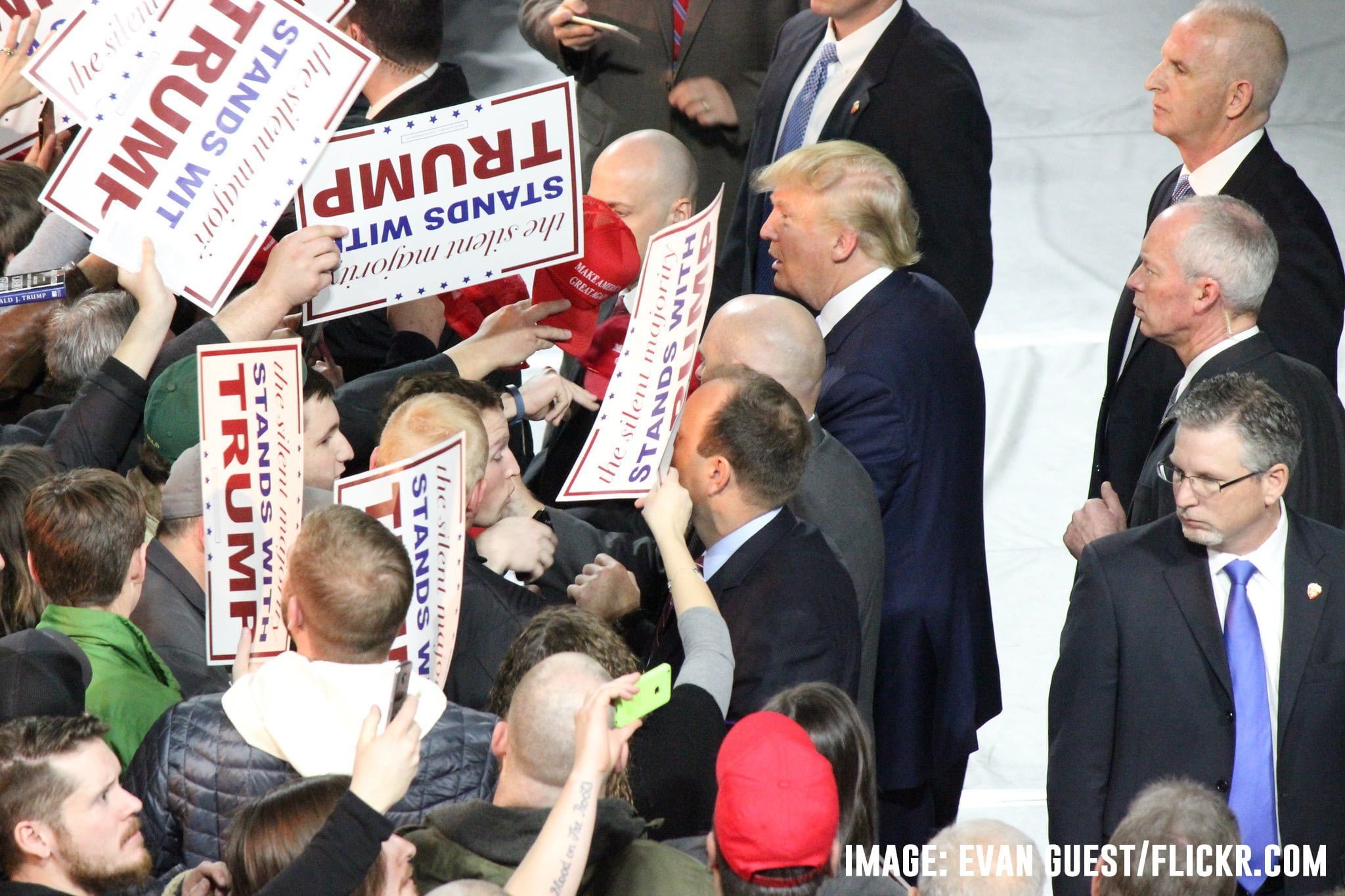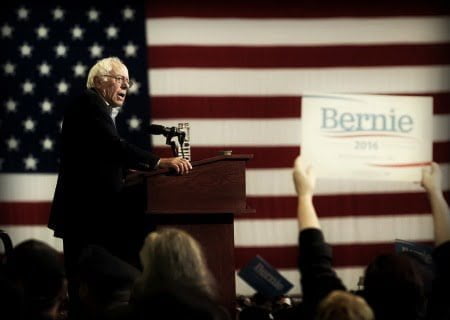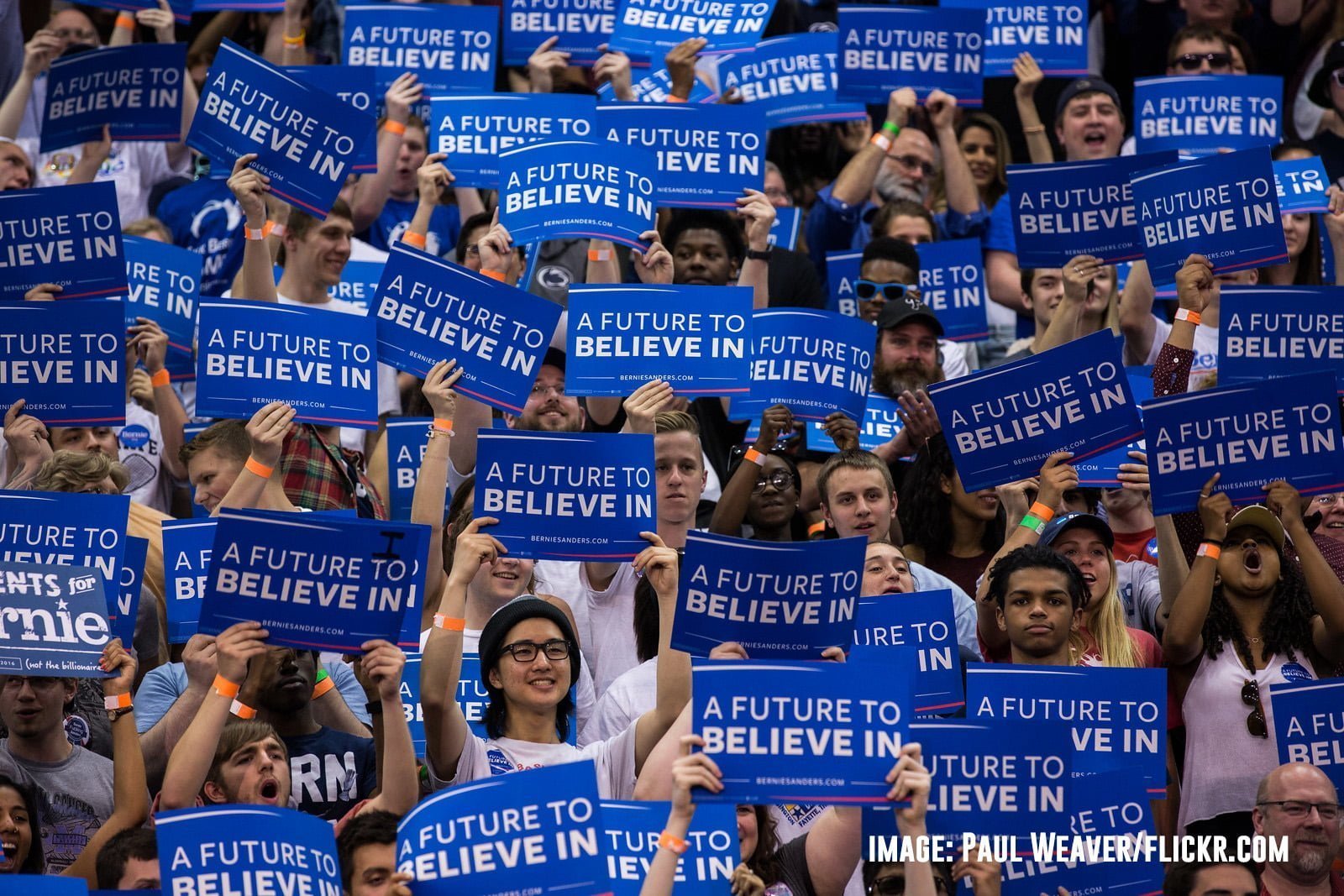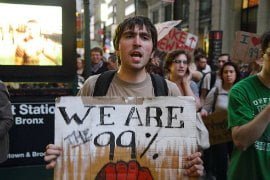America is going through the biggest political upset in living memory, perhaps longer. Never has the American Establishment, having lost control over the situation, been in such a state of confusion. Rob Sewell, editor of Socialist Appeal, looks across the pond to the radical mood that is developing around Bernie Sanders.
“Many Americans seem to have concluded that the political system is so corrupt and dysfunctional that only a total outsider can be trusted to take charge.” (Gideon Rachman, the Financial Times, 9/2/16)
America is going through the biggest political upset in living memory, perhaps longer. Never has the American Establishment, having lost control over the situation, been in such a state of confusion.
While the billionaire Donald Trump has succeeded, on the Republican side, to tap into a populist upsurge against the Establishment, the astonishing rise of Bernie Sanders, a self-confessed and outspoken “democratic socialist”, has similarly connected with the frustration and anger of millions over the greed of corporate America.
This is not 2008, when Obama challenged Hillary Clinton. There was little to choose between them. Both were backed by Wall Street and the corporations. All the hype about America’s first black President, together with his key note promise of “Change”, soon led to disappointment and disillusionment.
This time round, the Democratic Party hierarchy cleared the path for the “coronation” of Hillary Clinton as their Presidential candidate. It was seemingly a foregone conclusion. The nomination of Bernie Sanders last May, who had long been an independent, was considered simply as adding legitimacy to Clinton’s presumed success.
Establishment alarmed
 With the Republican Party dominated by fringe candidates, starting with Trump, the American ruling class, alarmed by the crazed ideas being advocated, began to turn its back on its traditional ally. They were hoping for a figure like Jeb Bush, a more reliable pair of hands, to come to the fore – but this was not to be. Instead, Trump or the evangelist Ted Cruz were stealing the headlines and gathering increasing support.
With the Republican Party dominated by fringe candidates, starting with Trump, the American ruling class, alarmed by the crazed ideas being advocated, began to turn its back on its traditional ally. They were hoping for a figure like Jeb Bush, a more reliable pair of hands, to come to the fore – but this was not to be. Instead, Trump or the evangelist Ted Cruz were stealing the headlines and gathering increasing support.
In reality, the plans of the corporate elite were blown off course. Seemingly impotent to prevent a billionaire “upstart” winning the Republican nomination, they have written off the Republicans, as a party out of control.
Despite certain reservations, the ruling elite have swung behind Hillary Clinton. She is an articulate representative of corporate America, the candidate of Wall Street. Big money has flowed into her campaign. Banks and corporations have fallen over themselves to finance her nomination. Up until recently, she was regarded as a “shoo-in” for the Presidency.
But the Heavens have seemingly fallen in. Sanders’ “political revolution” message has struck a note everywhere, especially amongst the youth and the low-paid. The campaign has come alive. “All the talk is of students reeling under unpayable debts and of parents having to work at two or three low-paid jobs to make ends meet,” states the Financial Times. Sanders attacks Wall Street and big business, and with every attack, his support snowballs.
In complete contrast to Hedge Fund Hillary, Bernie Sanders, the self-styled “socialist”, has refused these “Super PACs” from business or to be bought by corporate money. Instead he has collected small donations from a staggering three million people, giving on average $27 per person to his campaign.
The Iowa caucus primary was considered a “draw”, but even here Clinton’s support evaporated. In particular, she was shunned by younger female voters under the age of 30, who favoured Sanders by a ratio of about six to one — the same ratio as young male voters.
However, New Hampshire, which Clinton was originally confident of winning, rallied to Sanders with a margin of over 20 percentage points. It was a landslide victory for a 74 year-old, white-haired man, a complete contrast to the typical professionally-groomed politicians, like Clinton. His caustic attacks on the wealthy promote trust in him, while Clinton is regarded as distinctly untrustworthy.
A gulf is opening up between them, which is resonating, especially with the youth and those turned off by the political Establishment, both Democrat and Republican.
Cynically playing the feminist card
 Clinton has now cynically appealed to “sisterhood” and the vision of becoming the first women President to galvanise support. But this has cut little ice. While many would like to see a woman President, they are not enamoured with the likes of Hillary Clinton. Today, she is reviled by women and men alike for personifying the Establishment.
Clinton has now cynically appealed to “sisterhood” and the vision of becoming the first women President to galvanise support. But this has cut little ice. While many would like to see a woman President, they are not enamoured with the likes of Hillary Clinton. Today, she is reviled by women and men alike for personifying the Establishment.
Amid falling polling numbers, several prominent female supporters of Mrs Clinton have jumped to her defence. The former Secretary of State, Madaleine Albright, who once said the death of hundreds of thousands of Iraqis was a “price worth paying”, went so far as to say that there was “a special place in hell for women who don’t help each other”. This crude remark simply hardened support for Sanders.
Another ageing feminist, Gloria Steinem, still fighting the 1960s “feminist revolution”, suggested that young females prefer Sanders to Clinton because of his popularity among young men: “The boys are with Bernie”, she said, implying that girls must slavishly follow Clinton.
Correctly, many young women were angry over this slur. “As a woman and a mother, I just find it so insulting that there is some sort of push to act as if I don’t get feminism because I am voting for a man. I’m not voting for genitalia. I am voting for my values,” wrote Sara Clement, a Bernie Sanders supporter.
“I could list a million reasons why I prefer Bernie to Hilary”, said Tennessee Thomas, 31, who has been hosting Sanders campaigning events in New York. “I am supporting Bernie Sanders because of where he stands on the issues.”
Thousands signed a petition entitled “Walk it back Ms Steinem – we aren’t here for the boys.”
While Steinem was forced to apologise for her remarks, claiming she “misspoke” and did not mean to imply “young women aren’t serious in their politics”, the one-and-only Bill Clinton turned into Wild Bill and accused the supporters of Sanders of using “misogynistic language” in attacking his wife!
“Political revolution”
 The support for Sanders, despite his age and appearance, has cut across gender. His left-reformist speeches have brought class issues to the fore. “Do we have the courage to take on the billionaire class?” asks Sanders. “The government belongs to all of us and not just a small number of wealthy people”, he states, which was much an attack on Hillary Clinton as on the billionaire class.
The support for Sanders, despite his age and appearance, has cut across gender. His left-reformist speeches have brought class issues to the fore. “Do we have the courage to take on the billionaire class?” asks Sanders. “The government belongs to all of us and not just a small number of wealthy people”, he states, which was much an attack on Hillary Clinton as on the billionaire class.
He goes on: “In order to bring about the changes that the American people want, we need a political revolution. And the concept of a political revolution, that’s not just rhetoric, that’s reality.”
This has caused the Clinton camp to panic. The results in New Hampshire added fuel to the fire by revealing that Mrs. Clinton had lost in every group of electors except two: the over 65s and those earning more than $200,000. Sanders won 84% of the youth and a big majority of women voters.
We have entered unchartered waters, with Sanders riding a popular wave and the Establishment in a state of consternation. Despite the talk of a “recovery”, there is no “feel good” factor. In fact, dark clouds are gathering on the economic front as the world economy heads towards a new slump. After raising interest rates in December, the Federal Reserve and Chair Janet Yellen have been forced onto the back foot.
“The presidential campaign is kicking into high gear just as Wall Street analysts warn of a rising risk of a slowdown or even recession in the US — a view that, if vindicated, would radically alter the political calculus”, explained Sam Fleming in the Financial Times. “As things stand, 72% of the electorate feels the economy is in recession, according to the American Values Survey released in November — even though the Great Recession is widely viewed as having ended in mid-2009.”
Paula Winterton from New Hampshire summed up the mood in the state. “They feel like it is not getting better,” she said. “There aren’t jobs and the wages are terrible.”
“You have a lot of people who feel like they have been left behind and are angry at the system,” said Carl Tannenbaum, chief economist at Northern Trust. “The experience of wage stagnation is now longstanding and has shaped the public consciousness,” added William Galston, a senior fellow at the Brookings think-tank.
Feel the Bern!
 At the same time, Wall Street and the bankers are making billions of dollars. This explains the burning rage in the United States. It has also placed the idea of socialism back on the agenda.
At the same time, Wall Street and the bankers are making billions of dollars. This explains the burning rage in the United States. It has also placed the idea of socialism back on the agenda.
While Sanders’ views of socialism are more in line with the idea of a reformed and human capitalism, it has nevertheless found a massive echo in a country that has traditionally long demonised such ideas.
Despite the reformist character of Sanders’ programme, his radical message and call for “political revolution” have struck home with millions. It has re-engaged many with radical politics and a vision of fundamental change.
As Washington Post columnist Catherine Rampell grudgingly admitted, the current generation of youth “love Sanders not despite his socialism, but because of it.”
“In my column today, I mentioned that one reason millennials prefer Bernie Sanders to Hillary Clinton is that they’re not just willing to look past Sanders’s socialism — they actually like his socialism. It’s a feature, not a bug. Here are some of the data I was referring to.
“In a recent YouGov survey, respondents were asked whether they had a ‘favourable or unfavourable opinion’ of socialism and of capitalism. Below are the results of their answers, broken down by various demographic groups.
“As you can see, overall, 52% expressed a favourable view of capitalism, compared with 29% for socialism. Republicans, those in families earning more than $100,000, and people aged 65-plus had an especially high regard for capitalism compared with socialism, but respondents in almost every demographic category demonstrated the same preference to some degree.
“There were just two exceptions to this pattern: Democrats rated socialism and capitalism equally positively (both at 42% favourability). And respondents younger than 30 were the only group that rated socialism more favourably than capitalism (43% vs. 32%, respectively).”
Revolutionary implications
 In a Gallup poll, 47% said they would vote for a socialist. However, the Gallup poll revealed that the biggest gap between young and old was on “socialist” candidates: while only 34% of respondents age 65 and older said they would be willing to vote for a socialist, among respondents younger than 30 twice that level (69%) said they would. This is an astonishing fact.
In a Gallup poll, 47% said they would vote for a socialist. However, the Gallup poll revealed that the biggest gap between young and old was on “socialist” candidates: while only 34% of respondents age 65 and older said they would be willing to vote for a socialist, among respondents younger than 30 twice that level (69%) said they would. This is an astonishing fact.
More importantly, these numbers are from last June, and Sanders’ campaign has gathered much more enthusiasm and support since then. “That suggests that voters’ willingness to vote for a socialist may have increased since Gallup last asked,” now states the Washington Post.
This has revolutionary implications not only for America but the rest of the world.
Given the political uncertainties, the American ruling class are seriously considering throwing their support behind Michael Bloomberg, the billionaire, who is thinking of standing as an “independent”.
The crisis in the capitalist parties, the sharp transformation of the situation, the abrupt change in consciousness, are all a reflection of the deep crisis of American and world capitalism. This political convulsion in the USA is the same phenomena as in Greece, Spain, Scotland and Britain generally, to name but a few.
The fact that this same deep rejection of capitalism, especially amongst the youth, is taking place now in the “belly of the beast” is of historic significance.
In the past, Sanders stood on an independent “socialist” ticket. His decision to stand on a Democratic ticket was a step backwards. The Democratic Party is the party of big business.
Today, there is a swathe of people looking beyond the Democrats. According to one poll, 43% of Americans now identify themselves as independents, which is the highest figure yet recorded. The two-party system is breaking down. In reality, those supporting Sanders are not supporting the Democratic Party as such, but the “political revolution” Sanders is offering. Sanders has turned US politics on its head and become a magnet for millions disillusioned with the system.
It is difficult to predict what is going to happen. We are in unknown territory. For Sanders to secure the nomination will be a truly gigantic task, despite his support. The Democratic machine will do all in its power to stop him. They will use the “Super Delegates”, unelected party loyalists, or some other trickery to prevent him winning.
If this happens, a lot depends on how he reacts. Denying Sanders the nomination through trickery could unleash a tidal wave of protest that could also lead to his break with the Democrats. Whatever he has said about supporting the winner, this could be quickly overturned by events.
This “shock and awe” could lead to the formation of a new party around Sanders, possibly a Democratic Socialist Party. We have recognised for a long time the need for an independent party of labour. This could in reality be the creation of such a party. The trade union rank and file, who are overwhelmingly backing Sanders, would stream in. It would attract millions under conditions of deepening capitalist crisis and would open a new stormy chapter in American history.
However, if he buckles to the pressure and endorses Clinton, this mass wave of support will evaporate in demoralisation. However, that would not be the end of the story. The pent-up anger and frustration – the growing rage – will not go away, but will intensify. The movement will inevitably seek a way forward until such time as capitalism is overthrown.






